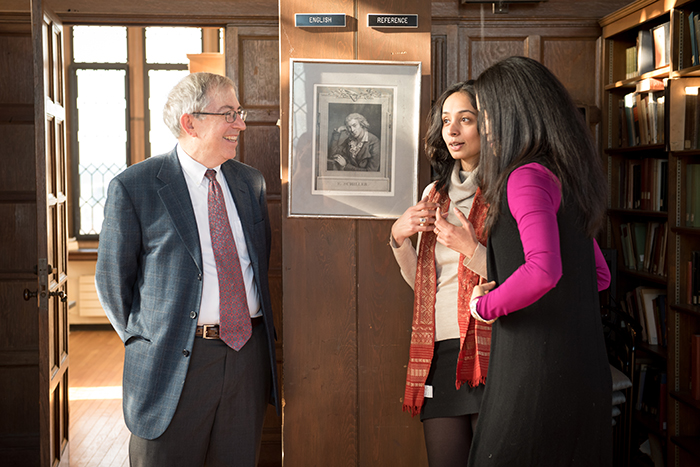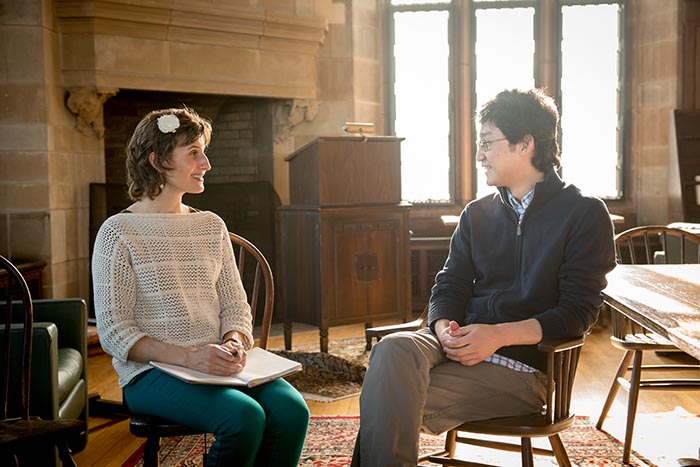During the first two years of study, students will focus on completing their coursework and language requirements. These vary somewhat based on the students program of study (combined PhD students will typically complete more required courses). All students must fulfill their language requirements before the beginning of the third year of study.

Coursework
Every student is required to complete 14 semester courses, including at least 7 in the Department of Comparative Literature. These courses must be chosen in a manner that fulfills the following requirements:
(1) Proseminar in Comparative Literature – this is offered in alternate years and taken for credit but is ungraded (satisfactory/unsatisfactory).
(2) Theory: 3 courses in literary theory and methodology
(3) Genre: 1 course each in poetry, narrative fiction and drama
(4) Periods: 1 course each in Ancient or Medieval European literature; in Renaissance or Baroque literature; in the Enlightenment or the Modern Age.
A single course may be used to cover multiple requirements.
Additionally, students are advised to develop a focus of study over two years: they should aim to combine intellectual bredth with a focus on one or two national or language-based literatures. This is intended to qualify students to teach Comparative Literature in combination with a specific, national language department. Such a focus should include intensive language study as relevant.
During the registration period of each semester, students should consult with the DGS (Director of Graduate Studies) to plan their courses. All schedules must be approved by the DGS, yet the students are responsible for the fulfillment of all requirements outlined above. During the departmental New Student Orientation, all incoming students will be given a worksheet of requirements, which they must update as necessary. This will help students, their advisers, and the DGS keep track of their progress through the program.
Directed Reading
A student may also take one or two individual Directed Reading courses (900a or 900b) which consist of an independent reading project in a clearly-defined area, under the supervision of a faculty member and with the approval of the DGS. In order to register for a directed reading course, students must fill out the Graduate School’s form (Individual Course Study Information) which will be sent to the registrar who will create the course and provide the CRN for registration.
Combined Degree Requirements
Students in combined degree programs will have somewhat different requirements for coursework: please see the detailed description here.
Transfer credit
Students who did graduate work at other universities may get up to four course credits for earlier studies, provided their first-year record at Yale is very good and on condition that all required categories will be fulfilled by the time of the Orals. Such credits count as part of the student’s course work outside the department. Applications for such credit should be submitted to the DGS at the end of the student’s first year at Yale. Students should include a transcript from the previous institution and documentation of course content (a syllabus, sample coursework, a letter from the former instructor etc). The DGS will evaluate the request by conferring with faculty in the relevant field and make a formal recommendation to the Graduate School.

Languages
The knowledge of languages is essential to the discipline of Comparative Literature. The Department therefore sets a stringent language requirement of four languages and strongly encourages advanced language study (including during the summers).
By the time of the Orals, every student must demonstrate:
- a high level of proficiency in English and two other languages (fluent reading of primary and secondary texts without a dictionary)
- a reading ability in a fourth language
Our department is committed to fostering breadth and depth of linguistic knowledge. For that reason, we have instituted a philological requirement, to be fulfilled in one of the three following ways:
(a) by learning to read an ancient or medieval language (such as Latin, Greek, Sanskrit, Classical Chinese, Old Church Slavonic, etc.). We strongly encourage all students whose research focuses on literatures before 1800 to pursue this option.
(b) by learning to read an Indigenous or Aboriginal language (Nahuatl, Quechua, Tlingit, Alyawarr, Cherokee, Guarani, etc.)
(c) by becoming proficient in languages from THREE different language families, besides English (e.g. German+Russian+Arabic; Hindi+Igbo+Swahili; Chinese+Hebrew+Portuguese, etc.).
Students may prove their proficiency either by taking courses where texts are studied in the original languages, or by a written exam administered in this department. Students who plan to take language exams should contact the DGS early in the semester in which they plan to take the exams so that appropriate arrangements may be made in a timely manner.
Combined Degree Requirements
Please note that combined degree students may have slightly different language requirements: see detailed descriptions here.
Documenting Completion
Once students have completed either relevant coursework or language exams successfully, they must complete the Language Requirement Form. Combined degree students must complete this form. If students do not complete this, there will be no official record of the completion of language requirements, which may interfere with students’ progress through the degree. For questions about documentation, please contact the Graduate Registrar.